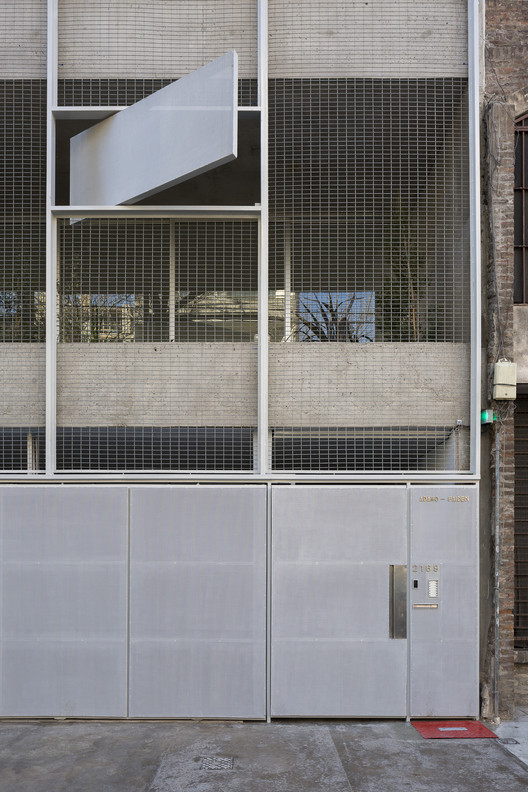Active Passive Hybrid Design Canteen TAISEI DESIGN Planners Architects - Engineers
2018-05-31 20:00
© Hiroyuki Oki
(C)小平之(Hirouki Oki)


架构师提供的文本描述。日本空调制造商大金位于一个工业园区,距河内约1小时车程,在越南开了一家食堂,建造了第一家生产工厂。除了一个节能空调系统(主动),我们的主要目标是优化利用自然资源,如日光和自然通风(被动),并使用当地的传统材料和方法,以便为工人提供一个舒适的聚会空间,以放松和茶点。
Text description provided by the architects. Located in an industrial park at about 1 hour driving from Hanoi, Japanese air conditioning maker DAIKIN made its first production facility with a canteen in Vietnam. In addition to an energy efficient air-conditioning system (active), our main goal was to make optimal use of natural resources like daylight and natural ventilation (passive), together with using local traditional materials and methods in order to provide workers a comfortable gathering space for relaxation and refreshment.
© Hiroyuki Oki
(C)小平之(Hirouki Oki)


作为一个双面外观系统,多孔砖块屏幕在前面的玻璃正面允许适当数量的自然光,同时保持视图。砖幕上的小开口粉碎了阳光,一天到晚的光线和阴影在不断地变化。门廊屋顶被用来为牧师的窗户腾出空间,即使在食堂的后面也能保证充足的日光。在每天凉爽的季节和时间里,可以打开低矮的遮阳窗,让新鲜空气进来。
As a double-skin facade system, the porous brick screens in front of the glass facade allows an appropriate amount of natural light while maintaining the view. The small openings in the brick screen shatter the sunlight, with a play of light and shadow constantly changing throughout the day. A gabled roof is used to make space for the clerestory windows, ensuring sufficient daylight even in the rear of the canteen. During the cooler seasons and hours of each day, the low side awning windows can be opened letting in fresh air.
© Hiroyuki Oki
(C)小平之(Hirouki Oki)


根据烟囱通风的原理,暖气自然上升,通过牧师窗口排出,形成自然的空气循环流。这将减少全年使用空调的频率。不同的颜色被用来创造一个充满活力和活泼的内部。木百叶窗不是固定的天花板,而是用来保持较高的天花板水平,给食堂带来更宽敞和舒适的感觉。
Based on the principle of stack ventilation, the warmer air will naturally rise up to be exhausted through the clerestory windows creating a natural air circulation flow. This will reduce the frequency in use of air conditioning throughout the year. Various colors are used to create a vibrant and lively interior. Instead of installing a regular ceiling, wooden louvers are used to keep a high ceiling level giving a more spacious and comfortable feeling to the canteen.
Floor Plan


在面对大门的外立面上,我们创造了一种令人印象深刻的越南氛围,并带有装饰性的砖块图案。手工制作每个砖块屏幕的工匠的痕迹在砖块纹理上是可见的。这些图案与砖墙的沉重形成了鲜明的对比,尤其是在夜间,光线和阴影与光滑的油漆墙形成了鲜明的对比。
On the exterior facade which faces the main entrance gate, we have created an impressive Vietnamese atmosphere with decorative brick patterns. Traces of craftsman who made each brick screen by hand are visible on the brick texture. The patterns form a contrast with the heaviness of a brick wall especially at night when light and shadow form a stark contrast with the smooth painted walls.
© Hiroyuki Oki
(C)小平之(Hirouki Oki)


Section/Diagram
剖面/图表


© Hiroyuki Oki
(C)小平之(Hirouki Oki)


总的来说,采用越南传统材料和建筑方法的铰接式被动设计策略创造了一个精致的立面和舒适的饮食空间。此外,结合主动设计策略和被动设计策略的混合系统增强了对自然资源的利用,并创造了适合目前越南热带气候的可持续建筑。
Overall, the articulated passive design strategies with Vietnamese traditional materials and construction methods have created a refined façade and comfortable eating space. Additionally, the Hybrid system combining Active design strategies and Passive design strategies has enhanced the use of natural sources and created sustainable architecture suitable for the present Vietnamese tropical climate.
© Hiroyuki Oki
(C)小平之(Hirouki Oki)








































Architects TAISEI DESIGN Planners Architects & Engineers
Location Khu công nghiệp Thăng Long II, Yên Mỹ, Hưng Yên, Vietnam
Lead Architects Yasutaka Maeda, Kuninori Maeda, Yuki Miyamoto
Area 2000.0 m2
Project Year 2017
Photographs Hiroyuki Oki
Category Dining Hall
Manufacturers Loading...
























